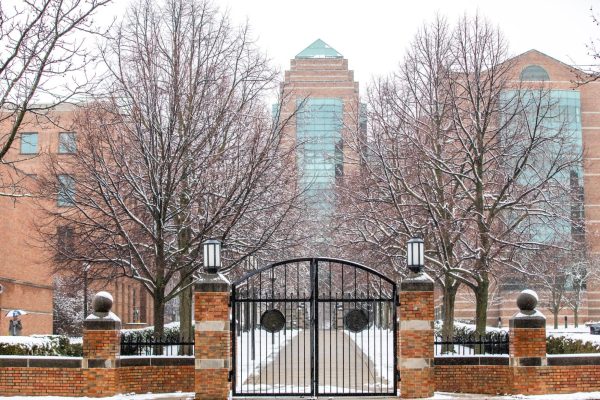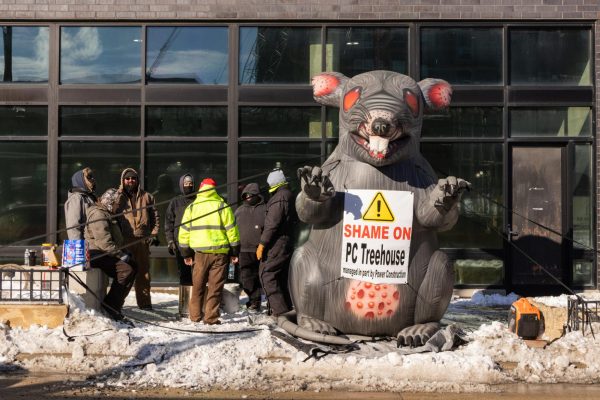IFUND nearing crossroads
Nov 16, 2004
Shawn Wax never thought red and blue golf grips could be his fund-raising tool.
Wax, the IFUND director of development, was the recipient of a Spencer Atkins joke. Atkins, an IFUND donor, replaced Wax’s Illinois golf grips with Kansas Jayhawk grips.
Among the Bloody Marys, Miller Lite cans and 14 IFUND volunteers serving eggs and hash browns to the $10,000 athletic department donors inside the Stadium Club at the Oct. 16 Michigan football game was Wax’s golf-grip story. Everyone – donors and non-donors – wanted to find Wax to hear the story.
“They were looking for me,” Wax said. “I don’t have to go find them. The conversation gets going before I have to say anything and I can tell them what will interest them about (the IFUND).”
And Wax needs all the interest he can get.
Get The Daily Illini in your inbox!
The IFUND has successfully raised money since 1946 to pay for new facilities, scholarships and academic assistance for athletes by shaking hands and memorizing faces for more than nine hours during a home football game. With tuition costs rising, Wax projects the IFUND will face a $220,000 deficit by 2008 to pay for the 265.5 Illinois athletic scholarships. To combat the deficit, the IFUND staff plans to use the Internet to raise money in the fashion of national political campaigns, something new to athletic fund-raising everywhere. With the evolution of college athletics into a win-at-all-costs operation, fundraising must provide more and more money each year so the athletic department can remain competitive.
“There is extraordinary pressure to raise additional money to be in a better position to be more competitive,” said University of Oregon professor of sports marketing Dennis Howard. “As a result, over the last 20 years, athletic departments are having fund-raising departments do more.”
And Illinois is no different.
Donations for the IFUND have almost doubled in the last 10 years, from $2.9 million to $5.4 million. The donations help support the new facilities, the construction and working budget for the Irwin Academic Center and the increase in scholarships after the University added sports like softball, which began play in 2000.
“The money people donate goes to support the student athlete,” Wax said.
Donors give money two ways: through private donations or endowments and annual membership costs. Private donors can direct their donations to a specific cause. Alumnus Richard Demirjian donated $1.5 million for an indoor golf facility. Former Illinois golfer and assistant coach Arthur R. Wyatt donated $1.2 million to endow the salary of the head coach of the men’s golf team.
The minimum annual membership cost is $25, which qualifies for the Arrow club. Eight levels of annual donations are available to the 5,188 members, the highest being the Loyalty Circle at $10,000 a year. Each different donor level comes with its own benefits, such as priority tickets for football and men’s basketball games and access to the Stadium Club’s complimentary food and drinks before football games.
Wax and five full-time fund raisers spend 80 percent of their time cultivating new relationships with potential donors and spending time with current donors – spending a few minutes on the phone with them, having dinner with them and inviting them to parties at Wax’s house. The other 20 percent of Wax’s time is spent working out the details of donations – making sure the paperwork is correct.
Howard said most athletic fund-raising groups have two percent of their membership supply 80 percent of their revenue. Illinois does not follow such an extreme pattern. The 292 Loyalty Circle members, which constitute 17.7 percent of all donors, donate $292,000 – 54 percent of the IFUND’s annual membership costs. The IFUND heavily recruits wealthy donors. Loyalty Circle has increased by 30 donors each of the last four years.
“I’m better off chasing wealthy people and spending my time with wealthy people,” Wax said. “I’ve learned how to take a wealthy person and make them an Illini fan. I’ve yet to figure out how to take an Illini fan and make them rich.”
The IFUND membership is like a diamond. It has a large group of Loyalty Circle members at the top. It widens in the middle with 1,091 donors from $ 2,999 – $1,000, and declines at the bottom, with 762 donors donating under $100.
Unfortunately for the IFUND, most of the wealthy donors are aging baby boomers, and Wax has not been able to find enough young rich donors to take their place.
“It is somewhat like Social Security, if you think of the baby boomer situation,” Wax said. “The theory is when all the baby boomers go through it, there will not be enough money to fund them. The same can be said about the IFUND.”
Just like Social Security, the IFUND projects deficits in the future. With rapidly increasing tuition, the IFUND will be not be able to pay for all of Illinois’ 265.5 scholarships. Illinois athletic director Ron Guenther expects the IFUND to grow by 5 percent each year, Wax said. Scholarship costs will rise 14 percent in 2005, and Wax projects scholarship costs to increase more than 24 percent in the next three years, while Guenther’s model only requires a 15 percent IFUND increase in the same time span, leading to a deficit in 2007. Wax projects the IFUND will bring in $6.1 million in donations in 2007. Scholarship costs project to $6.11 million – a $10,000 deficit.
“We do know that if we are going to meet the rising costs in the future, we are going to have to change in the future,” Wax said. “That answer, I’m not really sure of.”
One area Wax wants to improve on is increasing the number of low-level donors. Wax wants to increase those who donate $250 or less a year to 10,000 donors.
“Ideally, we would like a higher percentage of our money to come from a large consistency,” Wax said. “If those lower donors gain more wealth, we may be able to get larger donations from them in the future.”
The Internet is another tool Wax is looking to utilize. Howard Dean raised $50.3 million from a grassroots Internet campaign for his unsuccessful bid at the Democratic presidential nomination this year. Dean obtained small donations from people all over the country. In athletic fundraising, using the Internet is something Oregon’s Howard has yet to see.
“That is a mechanism that deserves more attention,” Howard said.
Wax envisions using e-mail to match donors and potential donors with what specific areas of the athletic department donors want to help – say, the women’s soccer team – and then Wax will talk to the potential donors about how they can improve the program. He also wants to find a way to make online donations possible.
“It is embarrassing to say at a university like Illinois, but our Web site is the most embarrassing site in the history of college athletics,” Wax said.
An Internet grassroots campaign could help Wax find a way to replace the aging IFUND population. Several other schools have been utilizing grassroots campaigns – without Internet use – for years. In the 1930’s, Clemson began it’s IPTAY program, which stands for “I Pay Ten Dollars a Year.” The Tigers wanted to get donors used to the idea of giving money each year to the athletic department. In time, donors may be willing to give more. Today, IPTAY costs $100 and Clemson raises $10 million a year. Fresno State, with a similar grassroots campaign, brings in $6-8 million in revenue. Both schools raise more money than Illinois does through its diamond structured fund-raising model.
To solve the projected deficit, Wax must try to raise more than 3 percent of the UI Foundation’s $174.6 million of donations – like it did this past fiscal year. About 40 percent of IFUND members donate to the UI Foundation, Wax said.
“We all use UI Foundation as our bank,” said Illinois associate chancellor for development Lynette Marshall. “Various fundraisers that work for athletics, ACES, or the library go out and meet with alumni to generate support for the school and bring money into it.”
Once Michigan defeated Illinois 30-19, Wax headed back out to the tailgates and made his way over to hear the Hello Dave Road Band, a rock cover group.
Atkins is one of several alumni footing the bill for this post-game party, and when he sees Wax, Atkins bellows with laughter. The men hug each other as Atkins tells Wax he planned the golf grip prank for weeks. He originally wanted to grip the clubs with all the Big Ten teams colors, but ended up picking Kansas “because of the whole Bill Self thing,” Atkins said.
Wax will not let the prank go unanswered.
“I’ve come up with a few things, but they’re too cruel,” Wax said.
And cruel would stop the checks from coming in.





